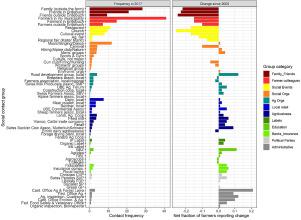Agricultural Systems ( IF 6.1 ) Pub Date : 2022-05-22 , DOI: 10.1016/j.agsy.2022.103435 Victoria Junquera , Daniel I. Rubenstein , Adrienne Grêt-Regamey , Florian Knaus

|
CONTEXT
Farm numbers are steadily declining in Europe and globally while farms become larger and more intensive. Driven in part by worsening macroeconomic conditions, these structural changes and the associated rationalization of agricultural supply chains have affected social relations in rural areas. In turn, farmers' social contacts influence farming decisions. Social and structural changes are thus interconnected, and they affect the resilience of rural areas through their influence on environmental, social, and economic capital.
OBJECTIVE
We examine the connection between farm structures and farmers' social contacts in the UNESCO Biosphere Reserve Entlebuch (UBE), a mountain region in central Switzerland with a strong presence of family farms, and explore the implications of social and structural change for rural resilience.
METHODS
We conduct a survey of N = 102 farming households and combine it with farm-level agricultural census data and interviews with key stakeholders (N = 13) to analyze farmers' current social contacts and their changes since the year 2000. We use regression and cluster analyses to examine the relationship between (changes in) social contacts and farm-level characteristics.
RESULTS AND CONCLUSIONS
Farmers in the UBE have a high, but decreasing frequency of contacts with family, friends, and colleagues and lower, but increasing frequency of commercial and administrative contacts. Workloads have increased by 6% in five years, driven by farm-level expansion of agricultural area (+5%)—including expanding ecological compensation areas—and intensification in managed areas (+3%), leading to parallel processes of intensification and extensification. Since most of these family farms do not hire workers, growing workloads directly impinge on farmers' free time, affecting informal contacts most. Farm managers in larger and more intensive farms have more frequent and more diverse, but also more rapidly declining, social contacts. Our results point to a net loss in social capital as social contacts become less frequent and shift from local and informal to regional and national professional contacts.
SIGNIFICANCE
A 17% decline in farm numbers in 15 years reflects the vulnerability of farms in this region. Growing financial strain, workloads, time pressure and the associated erosion of informal contacts contribute to this vulnerability. Policymakers from local to national should recognize the contribution of farmers' diverse social networks towards rural resilience and seek options to maintain and enhance such networks. Beyond direct interventions that foster social capital, policymakers should more rigorously consider the short- and long-term interconnections and tradeoffs between different forms of capital.
中文翻译:

农业结构变化和农民社会交往:来自瑞士山区的见解
语境
欧洲和全球的农场数量正在稳步下降,而农场变得更大、更集约化。部分由于宏观经济状况恶化,这些结构性变化和相关的农业供应链合理化影响了农村地区的社会关系。反过来,农民的社会交往影响农业决策。因此,社会和结构变化是相互关联的,它们通过对环境、社会和经济资本的影响来影响农村地区的复原力。
客观的
我们研究了联合国教科文组织恩特勒布赫生物圈保护区 (UBE) 中农场结构与农民社会交往之间的联系,该保护区位于瑞士中部的山区,拥有大量家庭农场,并探讨社会和结构变化对农村复原力的影响。
方法
我们对N = 102 个农户进行了调查,并结合农场层面的农业普查数据和对主要利益相关者( N = 13)的访谈,分析了农民当前的社会联系及其自 2000 年以来的变化。我们使用回归和聚类分析以检查社会联系(变化)与农场水平特征之间的关系。
结果和结论
UBE 的农民与家人、朋友和同事的联系频率较高,但频率较低,商业和行政联系频率较低,但频率较高。工作量在五年内增加了 6%,这主要得益于农场层面的农业面积扩张(+5%)——包括扩大生态补偿区——以及管理区域的集约化(+3%),从而导致集约化和扩展的并行过程. 由于这些家庭农场中的大多数不雇用工人,日益增长的工作量直接影响了农民的空闲时间,对非正式接触的影响最大。更大和更集约化农场的农场经理有更频繁和更多样化但也更快下降的社会联系。
意义
15 年内农场数量下降 17% 反映了该地区农场的脆弱性。日益增长的财务压力、工作量、时间压力以及相关的非正式联系侵蚀导致了这种脆弱性。从地方到国家的政策制定者都应该认识到农民多样化的社会网络对农村复原力的贡献,并寻求维持和加强这种网络的选择。除了促进社会资本的直接干预之外,政策制定者还应更严格地考虑不同形式资本之间的短期和长期相互联系和权衡。











































 京公网安备 11010802027423号
京公网安备 11010802027423号